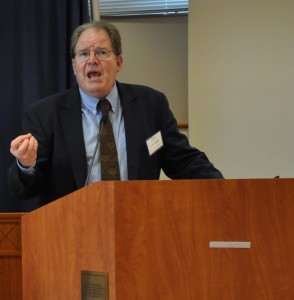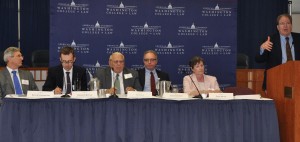At the September 2018 Global Congress on Intellectual Property and the Public Interest, panelists from around the world gathered to discuss the past and future of balance in copyright. One historic organization–the Digital Future Coalition–wove through the discussion, as a model of informed and effective advocacy. Here’s your backgrounder on that hidden gem of Internet governance activism.
What was the DFC?
At a September 2015 conference at the Program on Information Justice and Intellectual Property at American University’s Washington College of Law (WCL), participants recalled crucial, but little known public interest activism in the 1990s. At the heart of the story was WCL’s Peter Jaszi, who coordinated the Digital Future Coalition in the 1990s and designed the strategy for the fair use and free speech movement of the current day.
 Imperilled Internet.
Imperilled Internet.
The Digital Future Coalition (DFC), which began as a group of concerned librarians and legal scholars, eventually grew into a broad coalition of industry trade organizations in telecommunications, communications and information hardware, and data; digital start-ups; academia and libraries. They stood together to keep the Internet open and keep it from being crippled by copyright restrictions that would have turned it into a small set of walled gardens. They stood against legacy big media corporations that feared a digital future and were determined to throw copyright at the problem.
The issues included the Digital Millennium Copyright Act (DMCA), encryption and copyright creep. The coalition, then mainly librarians and academics, worked to crowbar fair use into the DMCA (as a justification for the exemptions that have now permitted millions of people to do creative work) and to limit massive overreach that would have made most of today’s Internet Service Providers unviable. They worked with others to block government’s attempts to design dysfunctional encryption. The crude encryption proposed—and ultimately blocked–would have hobbled existing devices and limited innovative new ones. The coalition also blocked media and software industries’ attempt to get databases copyrighted. That would have stalled many start-ups, including Google and any other search engine.
“It’s staggering to think of what almost happened,” said Ed Black, head of the Computer Communications and Information Association, a member of the DFC. “And it was Peter who had the vision, the strategy.”
New voices.
Thanks in part to the efforts of the DFC, databases continue, as they always have been in this country, not to be copyrightable. By contrast, many believe that copyrighting databases has put Europe far behind in digital innovation. But, said Black, the same four issues continue to be the issues today in intellectual property: Intermediary liability; fair use; interoperability; and copyright balance.
What has changed, he noted, is “a constituency of Internet users.” These are the people who showed up by the millions to block legislation that threatened the Internet, SOPA/PIPA, in 2012. “I would have loved to have them in the room 20 years ago. They are there now, it’s not automatic, and they’re not easily mobilized, but it’s an important new factor. “
Language and power.
How to talk to people now about the continuing problems? “It’s hard to show people who don’t know about copyright what’s at stake,” Black said. People easily get confused between real property and intellectual products, for instance. “I believe the other side [large media interests with a maximalist copyright position] has won the language battle in a big way. Infringement. Piracy. Theft.
“We need to explain that when we talk about copyright, we’re talking about government regulation over the flow of information, over people’s ability to communicate. We should weigh costs and benefits for that, and do a cost-benefit analysis.”
WCL’s Brandon Butler said, “Look, the Digital Future Coalition saved the Internet. It could have been nothing more than a big shopping mall. The Internet is the living embodiment of fair use. Our slogan is simple: Don’t kill the Internet.”
Hidden victories.
Attorney Jonathan Band, a stalwart of the library community, noted, “Money talks, and the other side always had a lot more money. And so a lot of our story about the Digital Futures Coalition is, ‘It could have been worse.’ And it could have been. The greatest accomplishments in legislative arena may be not what you pass but what you kill.”
Peter Jaszi pointed to a recent judicial decision ruling that copyright holders have to have reason to believe real infringement is taking place before issuing a takedown notice online: the so-called “dancing baby” case. “This is where we see the effects of what we did. It would not have happened without the Coalition.”
The Electronic Frontier Foundation (EFF) took Stephanie Lenz’ case (she was the mom of the “dancing baby”) and stuck with it for eight long years till the recent decision. “In DFC,” Jaszi recalled, “one of my jobs was to recruit organizations and convince them they had a stake. One of those groups was EFF, then almost exclusively and positively focused on privacy and some other Internet regulatory issues.” Even with the executive director’s support, it took work to get the board to agree. But today, EFF is a major voice on information justice.
People matter.
Michael Madison, a leading legal scholar on intellectual property and fair use, noted, “In this story, so much depended on the volunteerism of individual people. In the long run big concepts and trends matter, but in the short run how individual people take an opportunity and run with it makes a huge difference. It’s worth celebrating the contributions of the individual people.
“That’s an important lesson for anyone mentoring the next generation of students –their choices matter and the public interest matters. After all, there’s plenty of opportunity but people have to be inspired to contribute in those ways.”
A complete livestream of the event is available here.


